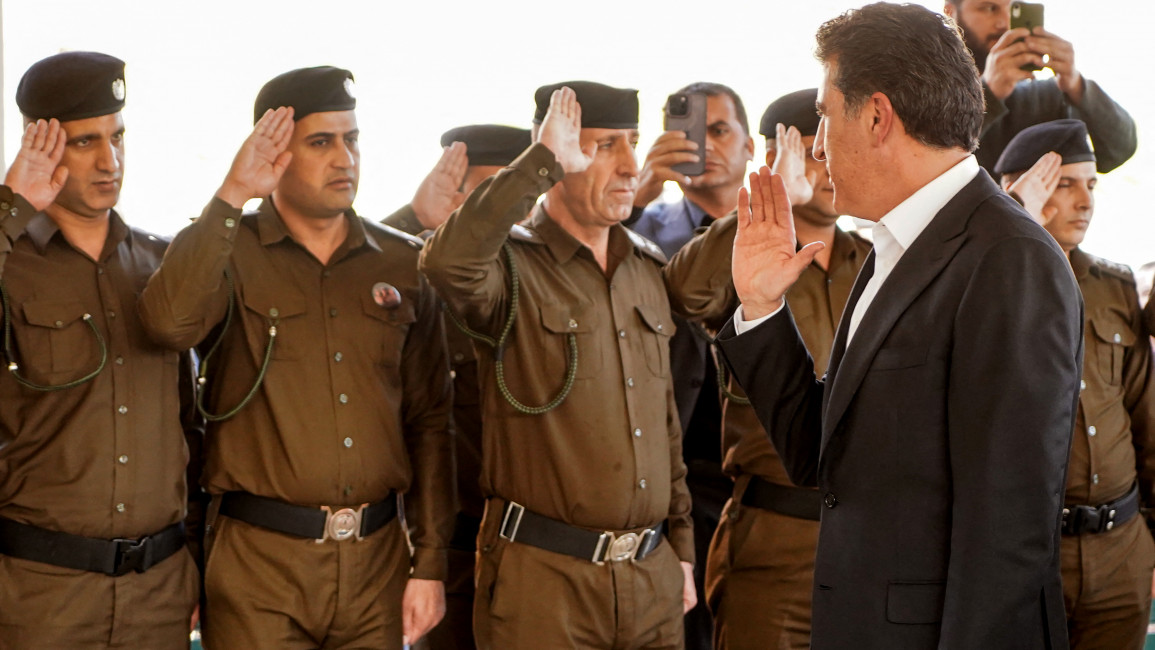Drug addicted father's 'savage' murder of 14-year daughter revives calls for death penalty in Iraqi Kurdistan
A Kurdish man, who had several arrest warrants, savagely killed his 14 years old girl in Erbil while under the influence of drugs. News of the killing went viral on Kurdish social media, with many users urging Kurdish authorities to implement the death sentence.
Bryar Fazel, 35, also a drug addict, killed his 14 years daughter Raha Bryar inside his house in Erbil's Mufti neighbourhood on Friday morning after reportedly "torturing her savagely". The killer turned himself in to the police the day after, Erbil police spokesperson Hogr Aziz told reporters at a press conference on Saturday.
Erbil's police spokesperson also said that 62 murder crimes were committed in Erbil province in 2022 and that Erbil police forces arrested 79 suspects based on murder charges.
The authorities in the Iraqi Kurdistan region have more or less halted carrying out the death penalty for decades as a means to convey respect towards human rights and appease the international human rights watchdogs - a tit-for-tat bargain to get political gains.
According to Item 7 of Article 10 from the law of the Kurdistan region's presidency, the president of the Kurdistan region has exclusive power to approve executions. In 2015. Masoud Barzani, the former president of the Kurdistan region, signed the death penalty for a Kurdish man and his two wives and the penalties were carried out. A court in Duhok city issued the death sentences to three individuals in April 2014 for murdering two schoolgirls.
The rest of Iraq is the same. According to the Iraqi binding laws, the Iraqi executive authority is not allowed to carry out death penalty sentences unless the president approves the sentences via republican decrees.
Several Kurdish citizens, lawmakers and lawyers called for the Kurdish authorities to implement the death penalty to deter criminals as crime rates were mounting every year.
"Before committing the crime against her daughter, the criminal [Bryar Fazel] was known to the Kurdish police and security forces. He had seven arrest warrants for serious charges, including deliberate shooting and murder attempts against his brother and father-in-law. He was also wanted as per a complaint by his wife on domestic violence charges. The criminal should have been arrested for all those charges before implementing the savage crime against her daughter," Omar Gulpi, Kurdish lawmaker from the Kurdistan Justice Group (KJG), said to The New Arab.
"Unfortunately, Kurdish police and security forces were very negligent in this dossier and they did not arrest him until he had committed that hideous crime against his innocent daughter. He killed her very savagely," Gulpi added.
According to local media outlets, the killer had tortured Raha and then hanged her with a ceiling fan.
Gulpi also urged the Kurdistan region's general attorney to launch legal cases against officials and formal forces that were "negligent and did not carry out their responsibilities".
Jihan Yassin, Raha's mother, told Rudaw, that she had left the house over a year and a half ago "due to continued abuse and mistreatment" by her husband, and her legal request for separation is yet to be settled by the court.
"I filed complaints, reached out to women's rights organizations, and called the Kurdistan Region’s domestic violence helpline," she told the outlet, adding that her calls for help went unheard.
Raha's murder by her father sent shock waves across Kurdish society. Many social media users have called for the Kurdish authorities to "publicly hang the killer" and "reinstate capital punishment for individuals convicted of murder."
Omar, 61, a tailor in Sulaimaniyah, told TNA that he supports the death penalty because he thinks it will terrify people from committing crimes. Referring to verse 179 from Surah Al-Baqarah in the holy Quran, he said," The divine law states that one who kills an innocent person should be killed as well. [Kurdish authorities] talk about human rights, but the authorities themselves abuse human rights here. Are the persons killed by criminals not human beings too?"
"When the killers are put in jail, they would become a burden on the government. We have seen many criminals being freed via special or general amnesty laws," he added. "I still remember, it was in 1979 when I saw the public execution of a man in Sulaimaniyah. The man had been convicted of throwing a bomb inside a primary school, killing some children."
Early this month, TNA excessively obtained a copy of a general amnesty bill that the executive and legislative authorities in the Iraqi Kurdistan region are attempting to pass.
According to the bill, special pardons will be given to various types of convicted prisoners at the reform prison houses run by the ministry. Those sentenced to the death penalty will have their punishment changed from execution to 15 years behind bars if reconciliations are reached with the complainers, otherwise, they would be imprisoned for 20 years.
In both scenarios, the time prisoners have already spent in jail will be considered in reducing their sentences.
Iraq has the fourth-highest rate of executions in the world, according to Amnesty International, which has recorded that more than 50 people were executed in the country in 2020, including many accused of belonging to the Islamic State group. Both terrorism and homicide charges carry the death penalty in Iraq.



